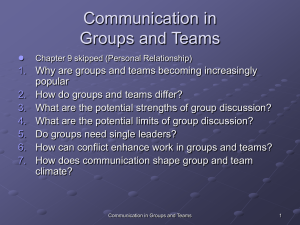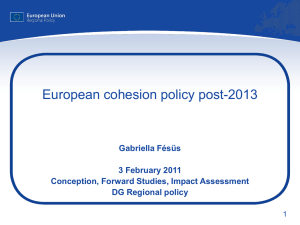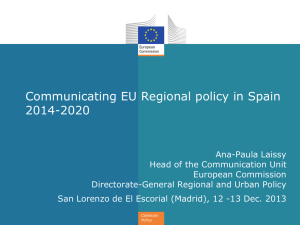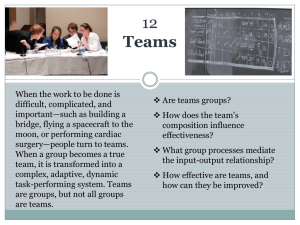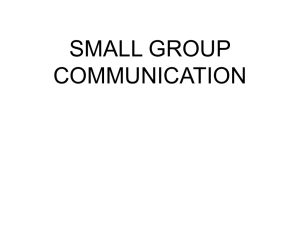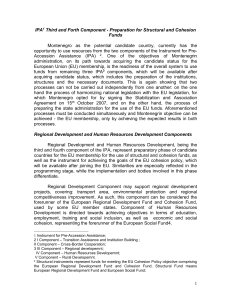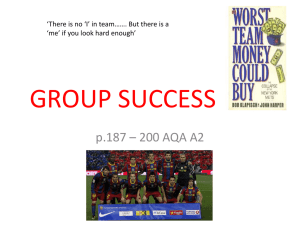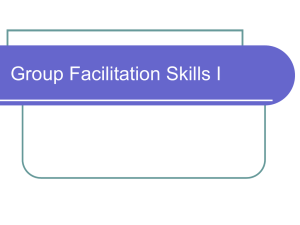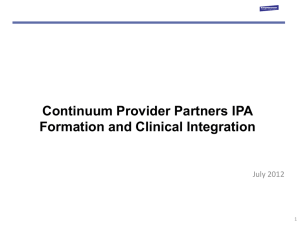some progress
advertisement
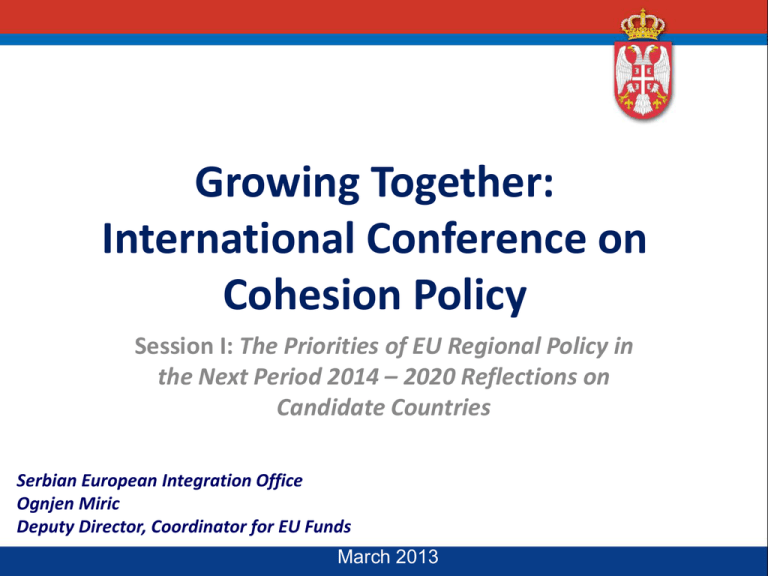
Growing Together: International Conference on Cohesion Policy Session I: The Priorities of EU Regional Policy in the Next Period 2014 – 2020 Reflections on Candidate Countries Serbian European Integration Office Ognjen Miric Deputy Director, Coordinator for EU Funds March 2013 Agenda • Serbia state of play: IPA and regional development policy • Readiness of candidate countries for Cohesion Policy (Chapter 22) • Cohesion Policy 2014-2020 priorities and their relevance for Serbia • How to ensure concentration of priorities • Conclusions IPA state of play in Serbia • Programming 2007-2013 has been finalised - €1.4 bill • All programming documents for IPA III-V have been prepared but not approved due to ’’late’’ CC status • All structures and procedures in place. Conferral of management powers expected by end of 2013 • Impact evaluation of IPA and other international assistance has been launched by NIPAC Office • Programming of IPA 2014-2020 has been launched • Main issues: maturity of projects and further need to increase institutional capacities Serbia’s regional development policy • Two out of five regions have administrative powers • Law on regional development (2009): needs to be changed • Shift from territorial based approach to sector approach (2013): needs to be operationalised • New Regional Development Strategies are under preparation • Regional councils are not operational • Regional development agencies needs to be profiled and when it comes to IPA management only involved in project preparation What does it mean ready for Cohesion Policy • Legal framework • Institutional framework – Institutional set up with clear roles, responsibilities and mutual relationships defined, encouraging efficient coordination • Administrative capacity – In planning, project identification, preparation and implementation • Programming – Strategic planning (from strategy to project level) • Monitoring and evaluation – Monitoring, (ex-ante, mid-term, ex-post) evaluation, MIS • Financial management and control – Decentralised management requirements, co-financing 2012 Progress Report findings, Chapter 22 Main issues per CC Iceland (has started preparations) Legal framework Macedonia (limited progress) Montenegro (some progress) Serbia (progress) Turkey (some progress) Multi-annual programme budgeting Multi-annual programming and co-financing Preparations are at an early stage Has been little progress Some progress Institutional framework Institutions identified Considerable improvements are needed Preparations are advancing There has been progress, but parallel systems Some progress Administrativ e capacity Training plan to be implemented The training plan was only partially implemented Preparations are at an early stage Progress can be reported Some progress, further increasing the institutional capacity is needed Programming Under development Preparation of mature projects is difficult Moderately advanced, but maturity of projects is issue Some progress, but lack of strategically developed investment plans Some progress, risks for the absorption of funds remain Monitoring & evaluation Under development Preparations are advancing At an early stage Some progress Some progress, evaluation capacity Fin. manag. and control In line with EU best practices Some progress was made At an early stage Good progress Some progress Chapter 22, Croatia experience Negotiation process November 2009 – April 2011 Opening benchmarks Closing benchmarks Development of an Action Plan for Meeting EU Cohesion Policy requirements Prove a satisfactory functioning of the decentralized implementation system Prove an adequate and mature project pipeline Prove a satisfactory level of implementation of IPA funding Submit an advanced and comprehensive draft of its National Strategic Framework Adopt an institutional set up for the implementation of the EU Cohesion Policy Adopt individual Organizational Development Strategies Submit a detail plan and timetable with regard to the setting up of a monitoring and evaluation system What all this means • One of the main aims of IPA is to prepare candidate countries for Cohesion Policy and prepare an efficient system for post accession • According to 2012 Progress Report candidate countries need to do more • Compared to Croatia, candidate countries might need to do (even) better Europe 2020 • Cohesion Policy is concentrating on the Europe 2020 Strategy’s priorities of smart, sustainable and inclusive growth • Candidate countries should not simply copy Europe 2020 priorities and targets • Europe 2020 priorities are candidate countries priorities, but ‘’our specificities’’ (macro-economic stability, underdeveloped infrastructure, technological dependence, high unemployment etc.) require specific approach and proper concentration Cohesion Policy 2014-2020 thematic objectives 1/1 Thematic objectives Relevance for Serbia IPA II Research & innovation Yes. Focusing on cooperation between business and research communities Information and communication technologies (ICT) Yes, but in short-term pending due to unclear strategic and institutional framework. Competitiveness of Small and Mediumsized Enterprises (SMEs) Yes. Improving business environment, including business infrastructure and financial support (if possible) to agriculture producers and export oriented SMEs. Shift towards a low-carbon economy Yes, but not likely to happen. Should be covered by environment and energy obj. Climate change adaptation & risk prevention and management Climate change strategy is missing (could be cross-cutting issue). Risk prev./manag. in justifiable cases. Cohesion Policy 2014-2020 thematic objectives 1/2 Environmental protection & resource efficiency Yes, but prioritisation needs to be applied between waste, water, air quality, energy efficiency and renewables Sustainable transport & removing Yes, especially railway Corridor X and the bottlenecks in key network infrastructures Danube (Corridor VII). Employment & supporting labour mobility Yes, especially youth unemployment. Social inclusion & combating poverty Yes, especially community-based services with proven impact. Education, skills & lifelong learning Yes, increasing its quality, relevance and inclusiveness and especially linking it to labour market needs. Institutional capacity building & efficient public administrations Yes, sector reforms and acquis. Programming Framework 2014-2020 Cohesion Policy programming Common Strategic Framework Partnership Contract Operational Programmes IPA II programming Common Strategic Framework Country Strategy Paper Sector Support Programmes Concentration matters • Compliance with strategies • Sector approach (better coordination) • Correlation between priorities from deferent sectors (transport and economy, energy and environment, transport and R&D, economy and R&D etc.) • Relevance and expected impact of projects (specific criteria for each type of projects: e.g. transport, energy, environment, business and social infrastructure) • Maturity of projects • Sufficient absorption capacities, including managerial skills and knowledge about the project subject on the side of beneficiaries We should not forget the reality • The equipment provided is not in use and priority eGovernment services are not yet operational • The Beneficiary has been lacking capacity from the beginning but the situation has worsened following the post-elections reorganisation • Sustainability of R&D facility is questionable when national R&D investments are 0.5%GDP • To start construction of intermodal terminal legal property issues needs to be resolved • Regional landfill is not in use after construction by 3 out of 9 municipalities Conclusions • Candidate countries need to do more to be ready for Cohesion Policy • Cohesion Policy 2014-2020 thematic objectives are relevant for candidate countries but specificities of each country should be taken into consideration • It is up to each country to establish its own system for management of EU (in agreement with EC) and national funds • Concentration and maturity of projects with proven impact are crucial (no-regret projects) Thank you for your attention omiric@seio.gov.rs
